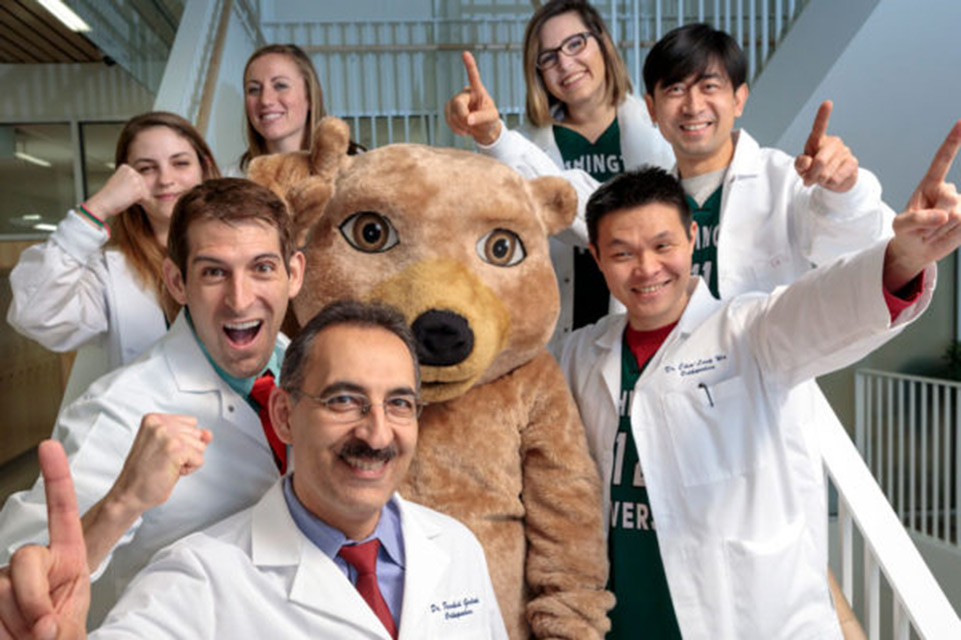Stopping Pain From the Inside
‘Smart’ Cartilage Cells Developed at St. Louis Shriners Hospital Release Drug When Stressed
What if, instead of addressing post-surgery pain with a pill or IV drip, a patient’s own cells could be triggered to prevent it?
This is one of the goals of a new field of medicine created by investigators with the Research Center at Shriners Hospitals for Children — St. Louis.
It’s called “mechanogenetics,” and its first target is to stop the damage caused by osteoarthritis, a painful joint condition. The work by researchers with the St. Louis Shriners Hospital and its partner, the Washington University School of Medicine, was published online Jan. 27 in the journal Science Advances.
“Drugs such as ibuprofen and naproxen that ease joint pain and lower systemic inflammation are the main treatments for osteoarthritis pain, but there are no therapies that actually prevent damage in the joints of patients with this debilitating form of arthritis,” said senior investigator Farshid Guilak, Ph.D., director of the St. Louis Shriners Hospital’s Research Center. “Through mechanogenetics, we can engineer cartilage cells to respond to the mechanical loading of the joint. Every time cells are under that stress, they produce an anti-inflammatory, biologic drug to reduce inflammation and limit arthritis-related damage.”
That news might sound like a miracle to the estimated 78 million arthritis sufferers in the United States, but to Guilak it’s a waypoint in more than three decades of work studying what happens to joints when they are put under pressure.
Guilak and his team first conducted experiments in the lab using cartilage cells from pigs to figure out how they sense when they are mechanically stressed. Those experiments revealed key pathways in cells that respond to stress, according to Robert J. Nims, Ph.D., a postdoctoral researcher in Guilak’s laboratory and the study’s co-first author.
Typical cells respond to this stress by causing inflammation, which leads to cartilage breakdown. The cartilage cells developed in these experiments, however, responded by secreting an anti-inflammatory drug that blocked cartilage damage.
“We altered snippets of DNA in the cells to tell them to do something different than normal when they sense a load,” Guilak said. “That is, to make an arthritis-fighting drug.”
That drug is called anakinra, or the brand name Kineret, which is used to treat rheumatoid arthritis and shows promise for treating osteoarthritis that occurs following joint injury. Prior studies of the drug have shown it to be safe in patients but ineffective when only injected into a joint one time. Guilak said he believes that is because, to work well, the drug must be released in arthritic joints over longer periods.
Lara Pferdehirt, co-first author, biomedial engineer and graduate research assistant in Guilak’s lab, said it’s like turning on a light. “With a light, you flip a switch, and a lightbulb turns on,” she said. “But in this case, the switch is the mechanical loading of a joint, and the bulb is the anti-inflammatory drug.”
In addition to reducing inflammation in arthritic joints, having specific cartilage cells deliver the drug only when and where it’s needed should make it possible to avoid side effects associated with long-term delivery of a strong anti-inflammatory drug to the entire body. Those side effects can include stomach pain, diarrhea, fatigue and hair loss.
All of which leads back to other possible uses for cells that can be engineered to deliver drugs or preventative treatments naturally. Although this technology is still years away from being available for patients, Guilak’s team plans to use mechanogenetics to alter other types of cells to make different drugs. “We can create cells that automatically produce pain-relieving drugs, anti-inflammatory drugs or growth factors to make cartilage regenerate,” he said. “We think this strategy could be a framework for doing what we might need to do to program cells to deliver therapies in response to a variety of medical problems.”

Keep In Touch
Join our mailing list to stay up to date on everything that's happening at Shriners Children's.
